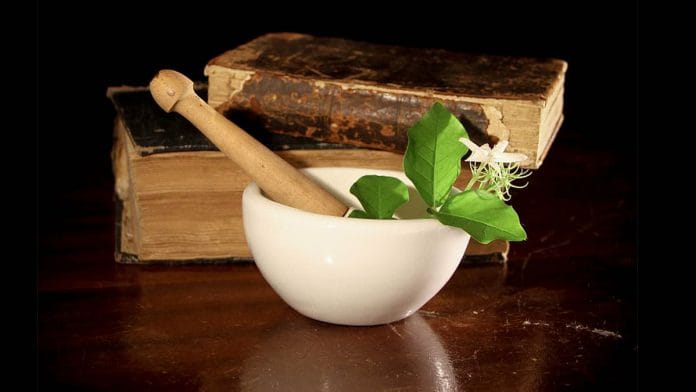New Delhi: Researchers associated with the Union AYUSH ministry have called for more studies to test the impact of Ayurveda on severe Covid-19 patients and those with comorbidities.
In a paper published in the peer-reviewed Journal of Research in Ayurvedic Sciences, the researchers have flagged the fact that only two of 26 ongoing clinical trials studying treatment of Covid-19 by Ayurveda herbs include patients suffering from a severe form of the disease.
“Most of the interventional therapeutic trials have been designed for asymptomatic, mild, or moderate cases of Covid-19 and only two trials have included severe cases,” the researchers note in their paper, titled ‘Ayurveda Research Studies on Covid-19 Registered in CTRI: A Critical Appraisal’.
The paper seeks to provide an insight into the trials involving Ayurveda and Covid-19, registered between 1 March and 25 June on the Clinical Trial Registry of India (CTRI), a government portal that lists all trials conducted on Indians.
The paper has been published in the July-September issue of the journal. Altogether, the paper looked at 58 studies, of which 52 are interventional and six observational (which don’t involve intervention by researchers). Among the 52, as many as 26 each deal with exploring Ayurveda for therapy and prevention.
Of the paper’s eight authors, seven work with the Ministry of AYUSH. According to the authors, “there is a need to design trials including severe cases and also cases with complications and involving comorbidities” to test the impact of Ayurveda on such patients.
The authors have, however, lauded the efforts of the Ayush ministry, which seeks to promote traditional systems of medicine and wellness — Ayurveda, Yoga and Naturopathy, Unani, Siddha and Sowa Rigpa, and Homoeopathy.
“Although certain issues have been observed related to the design of trials, however, the efforts put in by various stakeholders of ayurveda, especially the Ministry of Ayush, are laudable,” the paper said, noting that a large fraction of the registered trials — 39, or 67.24 per cent — are sponsored by the ministry.
Also Read: Gomutra pills, turmeric extract, spice-mix — the Ayurvedic concoctions under trial for Covid
Pat on the back for AYUSH ministry
Since the beginning of the Covid-19 pandemic, the AYUSH ministry has courted criticism for promoting Ayurveda solutions to prevent the disease — solutions that sections of the scientific community have dismissed as pseudoscience in the absence of conclusive research about their efficacy.
There have been many calls for the efficacy of treatments from the AYUSH school to be proved through data and research, as done with conventional medicine.
In the paper, the researchers have hailed the ministry for supporting several trial designs to generate evidence of efficacy.
“…The Ministry of Ayush, through its research councils, state governments and stakeholders, and also some private firms, is exploring on many fronts in different designs of research studies to generate some tangible evidence in Ayush against Covid-19 by conducting prophylactic and therapeutic clinical studies and antiviral effects,” it said.
Also Read: Incorrect to call Ayurveda, homoeopathy alternative medicine for Covid — top AYUSH official
‘To help global scientific community’
The results of the ongoing trials, the authors said, should be used to strategise effective solutions to benefit public health.
“Once completed, the results of these promising studies should be published at the earliest so that it will be useful for the policymakers from the traditional system of medicines to strategise effective solutions to benefit public health in these challenging times…” they wrote.
The results of these trials, they said, will help the “global scientific community to know about ayurveda clinical trials… being conducted on Covid-19 in India”.
“Across the globe, a lot of expectation and focus is on conventional medicine in the race to find effective solutions for Covid-19,” the authors added, saying the Ayurveda studies could become a “potential source of information for further collaborative studies at national and global level”.
Also Read: This is Kerala’s Ayurveda prescription to fight coronavirus and keep infections down






